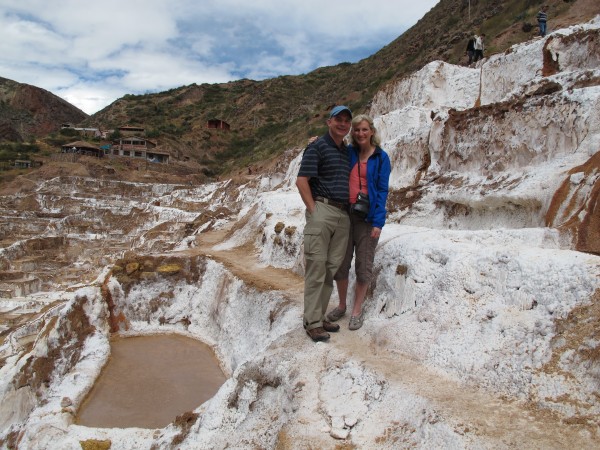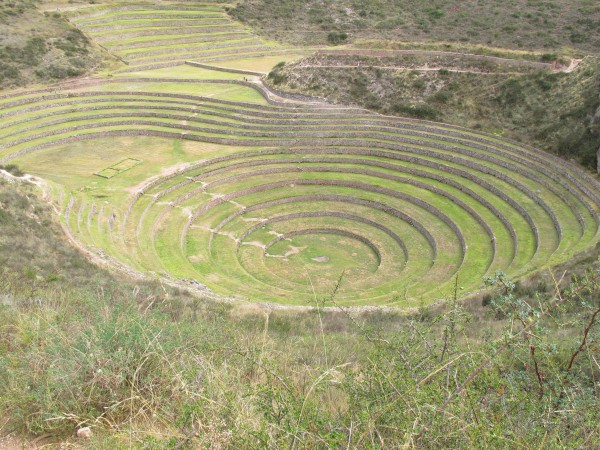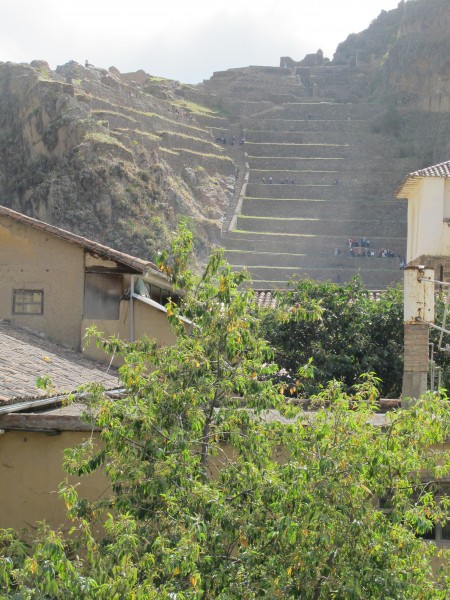We left our hotel in Urubamba narrowly escaping a giant parade. It seems what we thought was a large parade at the square the day before, was only one small part of the real parade. Our guide for the day, Juan Carlos, explained to us that the parade was made up of many villages that saved their money for an entire year to come to the bigger cities around them and participate in the week-long Festival of the Cross. On the last day, the cross from the local Catholic Church is taken down and carried through the streets of town. This was not a parade or celebration for the tourists. This was a celebration for the local people of the area. Still curious about what the gorillas from the day before could possibly mean, we asked our guide. The answer still has us chuckling today. Come to find out the costumes were black bear costumes representing the spectacle black bears which are prevalent in the area, but at some point someone on the parade committee decided that they liked the gorillas better so voila, the parade now comes with dancing gorillas.
We meandered our way to Ollantaytambo, stopping along the way at the Salt Pans. This amazing place is made up of 3000 small ponds carved into the side of the mountain where glacier water from the mountains runs through a deep pocket of salt inside the mountain leaching out the salt and creating an extreme salt water spring. The local people created a cooperative that captures the water into the small ponds and through 30 days of evaporation, rewetting, evaporation, rewetting comes up with a pond with three layers of crystal salt. This first is considered top grade white salt, the second Peruvian pink salt and the third agricultural salt.
After the Salt Pans we stopped at the crop circles. This is where the Inca people adapted crops to grow in higher altitudes. The crop would begin at the lowest circle then slowly would be migrated up one terrace at a time until it was fully conditioned to grow in the highest altitude and still produce a bountiful crop.
Late in the afternoon we made our way into Ollantaytambo. We stayed in a small hotel in the middle of town with a balcony that looked out over the main street and the Ollantaytambo Ruins on top of the hill at the end of the street. Once we checked in we decided to go for a stroll and get the lay of the land. Imagine our surprise when we entered the main square and saw a bandstand set up at one end with the same type of dancers and bands that we had just left in Urubamba. The Festival of the Cross was in full swing here as well. We were treated to numerous groups performing their dance at the square and then they would parade off with their bands taking up the rear of the parade. Small groups paraded up and down the streets all day and night moving from the square down the side roads then back again. We finally found out that each group had a location set up in town and that the groups paraded down the streets to visit each other bringing gifts of bread, meat, sodas and beer. Since our balcony looked out over the main road we could sit there and watch the dancers go up and down the streets until about 11pm. The other big part of the celebration was to set off what the Peruvians called fireworks. They didn’t actually go up in the air but was more akin to a percussion grenade. The shot would go off and then echo all around the mountains surrounding the town. It was really amazing. Little did we know but the groups began a parade to Mass at the Catholic Church just down the street from our hotel every morning at 5:30 am. So at the first light of dawn each morning instead of hearing the roosters crowing, we were treated to trumpets, trombones, tubas and drums playing the same processional music as group after group headed to Mass.
One odd thing I had read about Peru was that it was quite acceptable for men to urinate in public. Due to the town being full of local people there to celebrate the festival, in a single day I was treated to seeing 8 different men relieve themselves in what I would consider to be “public” areas. Directly across the river from our balcony was a small courtyard. As the festival began to wind down, many locals came through the courtyard and into the little house that was there. A pattern soon emerged—if it was a woman coming in they would go directly into the house, if it was a man they would wander over to the fence and commence peeing either on the courtyard flagstones or some attempted arch out over the railing into the river below. It did not seem to bother these people at all that they had an audience with a bird’s eye view of their antics.
